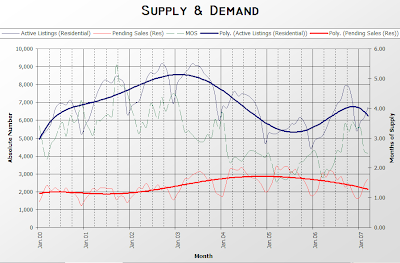My car is so great. It has a built-in CD player, a driver's seat with four independent adjustments, a tasteful spoiler, a spacious trunk, climate control, a powered sunroof, and gets over 30 miles to the gallon. It's comfortable, good-looking, and fun to drive. My car is comparable to a BMW or a Lexus, and is a great fit for me. Did I mention how much I like it? I mean, BMW or Lexus are a good fit for some people, but they don't really fit my style. You know though, it really is surprising how cheap it was for me to buy, considering how much other luxury cars go for these days...
So why am I rambling on about my car? What could this possibly have to do with home prices in Seattle?
Every once in a while someone tries to make the case that high home prices in Seattle are justified (or even that prices are too low) on account of what a swell city this is. Their argument goes something like this:
Seattle is so awesome! In fact, Seattle is so swell that it is completely reasonable to compare home prices here to cities such as New York and San Francisco, where homes are much more expensive! Seattle is after all a hip, up-and-coming world class city, probably even the hippest, most up-and-coming world class city around. So you see, it totally makes sense for home prices to shoot through the roof around here. We're just catching up to other comparable cities.
I definitely agree that Seattle is a great place to live. Much like my car, Seattle has many attributes that I really like: low pollution, beautiful scenery, proximity to nature, and a decent job market, to name a few. That being said, comparing Seattle to New York or San Francisco is just as ridiculous as comparing my
Saturn SL2 to a BMW or Lexus. They're just not in the same league.
Although I already knew this was the case, since I don't travel much (never been to New York, Boston, San Diego, and have only visited San Francisco once), it didn't really personally hit home with me until my recent business trip to Chicago. Even though I only spent one afternoon cavorting about and seeing the sights, I was immediately struck with the impression of "this is what a
real world class city looks like."
These are a few of the things I noticed (and later researched) about Chicago.
Chicago- Density: 12,604 people per square mile (source)
- Extensive Rail system, with 8 different lines running through the heart of downtown (source)
- Over 2,100 acres of waterfront parks bordering the downtown core (Lincoln Park, Millennium Park, Grant Park, Burnham Park), over 2,800 acres of waterfront parks total
- 16 major sports teams, with 28 total championship wins (source)
- Strong blues, soul, jazz, and gospel music scene. Birthplace of House music. (source)
- World famous government center (Richard J. Daley Center), world famous skyscraper (Sears Tower)
Now here's how Seattle compares in those same categories.
Seattle- Density: 6,901 people per square mile (source)
- Patchwork rail system, with an independent monorail, various street cars, disconnected, infrequent north-south routes, and various in-progress light rail lines. (source)
- 18.1 acres of waterfront parks bordering the downtown core (Waterfront, Myrtle Edwards, Olympic Sculpture), over 600 acres of waterfront parks total
- 6 major sports teams, with 4 total championship wins (source)
- Alternative music scene. Birthplace of grunge. (source)
- World famous landmark (Space Needle), well-known market (Pike Place Market)
If I had thought of it, I would have asked some Chicago natives whether they think Seattle is an "up-and-coming world class city." I bet they would have laughed at me.
While I was researching this post, I came across the
Wikipedia page on world class cities (or "global cities" as they are referred to on Wikipedia). It cites an "inventory of world cities" compiled by a university group in England. In their list, cities can have up to 12 points, with 10-12 point cities being considered "alpha world cities," and so on down the list. Here is the summary of the US Cities categorized on their list:
Alpha world cities (full service world cities)- New York (12 points)
- Chicago (10 points)
- Los Angeles (10 points)
Beta world cities (major world cities)Gamma world cities (minor world cities)- Boston (6 points)
- Dallas (6 points)
- Houston (6 points)
- Washington, D.C. (6 points)
- Atlanta (4 points)
- Miami (4 points)
- Minneapolis (4 points)
Seattle shows up way down the list with 2 points, having "some evidence of world city formation." Another categorization is quoted that lists "well rounded global cities" (such as New York, San Francisco, and Chicago) and "worldwide leading cities" (including Miami, Atlanta, and Denver), but Seattle is nowhere to be found on their list.
I mention these lists only to demonstrate that when I say "Seattle is not comparable to San Francisco or New York," it's not because I have some grudge against the city that I call home. I am not alone in my assessment of Seattle as a small city. It's not my biased opinion, it's a fact.
Again, I want to reiterate that
I like it here. Seattle is great, and I am happy to call it home. But let's be honest, it is disingenuous to compare Seattle to New York or San Francisco. Let's enjoy Seattle for what it is instead of pretending it is something that it's not.
Much in the same way that I would not pay $40,000 for a Saturn sedan, I am simply not willing to shell out $450,000 for an average house in Seattle.
Update: It seems
I've got an ally in Seattle P-I columnist Bill Virgin.
 ) next to any groups that have new posts since your last visit.
) next to any groups that have new posts since your last visit.





